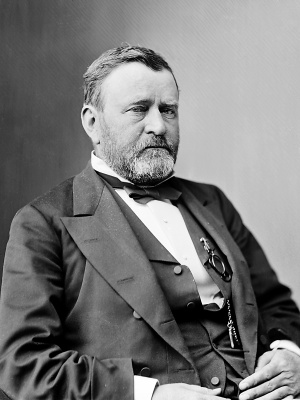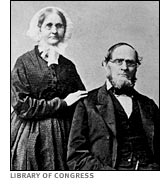Ulysses S. Grant
|
Hiram Ulysses Grant (1822-1885) - born 27 Apr 1822, Point Pleasant, Ohio, died 23 Jul 1885, Mt. McGregor, New York. Early YearsAt the age of 17, Grant received a cadetship to the United States Military Academy at West Point, New York, through his U.S. Congressman, Thomas L. Hamer. Hamer erroneously nominated him as Ulysses Simpson Grant, and although Grant protested the change, it was difficult to resist the bureaucracy. Upon graduation, Grant adopted the form of his new name with middle initial only, never acknowledging that the "S" stood for Simpson. He graduated from West Point Class of 1843, ranking 21st in a class of 39. At the academy, he established a reputation as a fearless and expert horseman. Grant drank distilled liquor and smoked huge numbers of cigars (one story had it that he smoked over 10,000 in five years) which may have contributed to his throat cancer of later life. Mexican WarGrant served in the Mexican War under Generals Zachary Taylor and Winfield Scott, taking part in the battles of Battle of Resaca de la Palma, Battle of Palo Alto, Battle of Monterrey, and Battle of Veracruz. He was twice brevetted for bravery: at Battle of Molino del Rey and Battle of Chapultepec. On 31 Jul 1854, he resigned from the army. Seven years of civilian life followed, in which he was a farmer, a real estate agent in St. Louis, Missouri, and finally an assistant in the leather shop owned by his father and brother.
U.S. Civil WarOn 24 Apr 1861, ten days after the fall of Fort Sumter, Captain Grant arrived in Springfield, Illinois, with a company of men he had raised. The governor felt that a West Point man could be put to better use and appointed him colonel of the 21st Illinois Infantry (effective 17 Jun 1861). On August 7, Grant was appointed a brigadier general of volunteers. Grant gave the Union Army its first major victory of the U.S. Civil War by capturing Fort Henry, Tennessee, on 6 Feb 1862, followed by Fort Donelson, where he demanded the famous terms of "unconditional surrender" and captured a Confederate army. Later in 1862, he was surprised by Gen. Albert Sidney Johnston at the Battle of Shiloh, but with grim determination and timely reinforcements, Grant turned a serious reverse into a victory on the second day of battle. In the campaign to capture the river fortress of Vicksburg, Mississippi, he spent the winter of 1862–63 conducting a series of failed attempts to overcome geographic and logistical obstacles to reaching the city. His eventual success in the spring and summer of 1863 is considered one of the most masterful in military history; it split the Confederacy in two, and it represented the second Confederate army to surrender to Grant. Grant was given command of besieged Union forces in Chattanooga, Tennessee, decisively beating Braxton Bragg and opening an avenue to Atlanta, Georgia, and the heart of the Confederacy. His willingness to fight and ability to win impressed President Abraham Lincoln. Lincoln appointed him lieutenant general, a new rank recently authorized by the U.S. Congress with Grant in mind, on 2 Mar 1864. On March 12, Grant became general-in-chief of all the armies of the United States.
Grant's fighting style was what one fellow general called "that of a bulldog". Although a master of combat by out-maneuvering his opponent (such as at Vicksburg and in the Overland Campaign against Robert E. Lee), Grant was not afraid to order direct assaults or tight sieges against Confederate forces, often when the Confederates were themselves launching offensives against him. Once an offensive or a siege began, Grant refused to stop the attack until the enemy surrendered or was driven from the field. Such tactics often resulted in heavy casualties for Grant's men, but they wore down the Confederate forces proportionately even more and inflicted irreplaceable losses. Grant has been described as a "butcher" for his strategy, particularly in 1864, but he was able to achieve objectives that his predecessor generals had not, even though they suffered similar casualties over time. In March 1864, Grant put Major General William T. Sherman in immediate command of all forces in the West and moved his headquarters to Virginia where he turned his attention to the long-frustrated Union effort to destroy the army of Lee; his secondary objective was to capture the Confederate capital of Richmond, Virginia, but Grant knew that the latter would happen automatically once the former was accomplished. He devised a coordinated strategy that would strike at the heart of the Confederacy from multiple directions: Grant, George G. Meade, and Benjamin Franklin Butler against Lee near Richmond; Franz Sigel in the Shenandoah Valley; Sherman to invade Georgia, defeat Joseph E. Johnston, and capture Atlanta; George Crook and William W. Averell to operate against railroad supply lines in West Virginia; Nathaniel Banks to capture Mobile, Alabama. Grant was the first general to attempt such a coordinated strategy in the war and the first to understand the concepts of total war, in which the destruction of an enemy's economic infrastructure that supplied its armies was as important as tactical victories on the battlefield. PresidencyGrant became the 18th President of the United States and served two terms from 4 Mar 1869, to 3 Mar 1877. He was chosen as the Republican presidential candidate at the Republican National Convention in Chicago, Illinois on 20 May 1868, with no real opposition. In the general election that year, he won with a majority of 3,012,833 out of a total of 5,716,082 votes cast. Despite all the scandals, Grant's administration presided over significant events in U.S. history. The most tumultuous was the continuing process of Reconstruction. He favored a limited number of troops to be stationed in the South—sufficient numbers to protect rights of southern blacks and suppress the violent tactics of the Ku Klux Klan; not so many that would harbor resentment in the general population. Later lifeAfter the end of his second term, Grant spent two years traveling around the world. He visited Sunderland, where he opened the first free municipal public library in England. Grant also visited Japan. In the Shibakoen section of Tokyo, a tree still stands that Grant planted during his stay. In 1881, Grant placed almost all of his financial assets into an investment banking partnership with Ferdinand Ward, as suggested by Grant's son Buck (Ulysses, Jr.), who was having success on Wall Street. Ward was known as the "Young Napoleon of Finance." In this case, Ward swindled Grant in 1884, bankrupted the company, Grant and Ward, and fled. And to make matters worse, Grant found out at the same time that he was suffering from throat cancer. Grant and his family were left destitute (this was before the era in which retired U.S. Presidents were given pensions). The author Mark Twain had admired some magazine articles Grant had written about the war and offered to publish Grant's memoirs. Grant was now at this time terminally ill and fought to finish his memoirs in the hope they would provide financially for his family after his death. Although wracked with pain and almost unable to speak at the end, he finished them just a few days before his death. The memoirs succeeded in providing a comfortable income for his wife and children, selling over 300,000 copies and earning the Grant family over $450,000 ($9,500,000 in 2005 dollars). Twain called the memoirs "the most remarkable work of its kind since the Commentaries of Julius Caesar," and they are widely regarded as among the finest memoirs ever written. Ulysses S. Grant died at 8:06 a.m. on Thursday 23 Jul 1885, at Mount McGregor, Saratoga County, New York. His body lies in New York City, beside that of his wife, in Grant's Tomb, the largest mausoleum in North America. Father: Jesse Root Grant (1794-1873) Born near Greensburg, Pennsylvania, 23 Jan 1794 Mother: Hannah Simpson (1798-1883) Marriage:
Children:
Assignments:
Personal Description:
See Also: Links:
Books:
|

